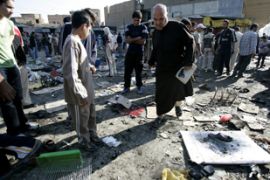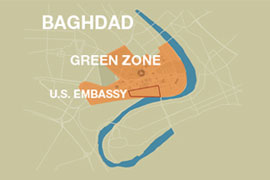Deadly blast hits Baghdad market
Suicide attack comes as Iraqi parliament decides to hold sessions outside Green Zone.

Colleagues said the dead journalist, 50-year-old Muhieddin Abdul-Hamid, was a local anchor for the station in Mosul, the centre of an ongoing US-Iraqi operation against the most prominent remaining stronghold of al-Qaeda in Iraq.
| Your Views |
|
Should the US have a long term presence in Iraq? |
Excluding Abdul-Hamid’s death, the New York-based Committee to Protect Journalists says at least 129 journalists and 50 media support workers have been killed since the war started.
A suicide bomber on a motorcycle also struck a Baghdad checkpoint manned by members of an Awakening council on Tuesday, killing one and wounding four, in the latest attack targeting Sunni groups that have turned against al-Qaeda in Iraq.
Another suicide car bomber struck a police checkpoint in central Baqouba, northeast of Baghdad, killing one policeman and wounding 19 other people.
Parliament shift
The deadly attacks came on the same day the Iraqi parliament announced it will start holding sessions outside the US-protected Green Zone in autumn.
The 275-member legislative body currently meets in a heavily guarded convention centre inside the Green Zone.
 |
The Green Zone houses the US and British embassies as well as many Iraqi government offices.
Khalid al-Attiya, the deputy parliamentary speaker, told legislators that they will move to the Saddam Hussein-era parliament building for the next legislative term, which is due to begin on September 1.
The National Assembly building that was used by the Iraqi parliament under Saddam is in the Allawi district, about 500 metres away from the blast walls that form the perimeter of the Green Zone on the west side of the Tigris River.
It was looted and burned in the chaos that followed the fall of Baghdad to US forces in April 2003.
But al-Attiya said its reconstruction has been completed.
Amara surrender
Followers of Muqtada al-Sadr, the Iraqi Shia leader, have meanwhile begun to surrender to government forces in the city of Amara, according to government officials.
The interior ministry said groups are turning in their weapons two days in advance of a military crackdown.
Amara is said to be a stronghold of al-Sadr’s Mahdi Army and the centre of weapons smuggling from Iran.
The clampdown on the city follows similar efforts in Basra and Baghdad’s Sadr City district.